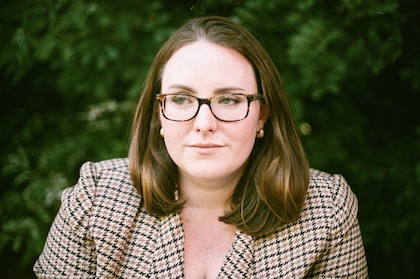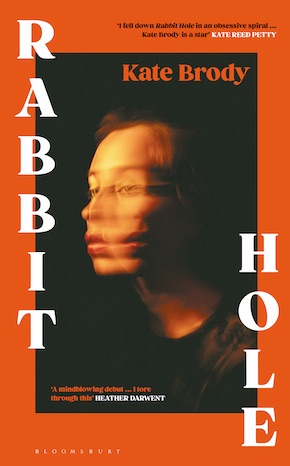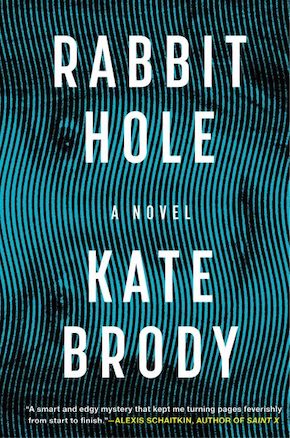Kate Brody: Missing people, muddled lives
by Farhana GaniKate Brody’s pacy debut thriller is a novel of our times. A missing woman, social media conspiracy theories, mental health issues, suspicion, trust, self-harm and family trauma are woven together to give us a troubling, riveting and sharply written noir set on America’s East Coast. What’s the worst that can happen when you’ve already lost everything that matters most?
On the ten-year anniversary of her older sister Angie’s disappearance, 26-year-old Teddy Angstrom’s father commits suicide. Scars are reopened as Teddy steps in to support her mother. The family already has an unconventional history. Her parents got together after her widowed mother married her brother-in-law, who left his wife and young son for her. The missing person police investigation created further speculation, gossip and unwanted intrusion into their broken lives. Despite these events, Teddy’s confident nature leads to a relatively contented life. Until now.
Whilst going through her father’s things, grief-stricken Teddy uncovers his deep obsession with a Reddit true-crime community investigating the mystery surrounding Angie, including possible sightings and all sorts of wild theories. Teddy is drawn in, and the deeper she digs the more embroiled she becomes, jeopardising her relationship with her new lover Bill and her coveted teaching position at a prestigious school, where she is much-liked by staff and students. As well as her mother to keep an eye on, there’s Wolfie, Angie’s now ancient Irish wolfhound, so frail he reeks of death. But he’s a reminder of happier times, and neither Teddy nor her mother Clare are able to release him from their lives. Teddy’s drinking turns from social to soothing to oblivion as she self-destructs in her search for answers. Teddy connects with Mickey, the same Reddit ‘investigator’ her father was working with – a younger woman who looks uncannily like Angie did the last time Teddy saw her, and the two try to join the dots surrounding the unsolved mystery. Teddy’s obsession and heavy drinking take over her life, eclipsing everything else. But who really is Mickey? And why is she so keen to help?
Rabbit Hole is a dark, disturbing and tightly written character-led page-turner following the dark descent of a woman willing to do whatever it takes, including the unthinkable, to quell a curiosity about her father’s suicide, even if it means sacrificing her own life in the process. As soon as I finished reading, I wanted to take a deeper dive into Teddy’s world.
Farhana: A grief-stricken woman looking for answers is at the heart of Rabbit Hole. Is this the book you originally set out to write? How did it develop once the words started flowing?
Kate: I knew the book would be about a grieving young woman, but the version of Rabbit Hole I originally set out to write was a road trip novel, featuring Teddy and Mickey traversing the country to find answers about Angie. It was thematically similar, but structurally different. Once I set the book in Maine and started writing, I found that the setting was so rich I wanted to stay in one place. I found that doing so allowed me to talk about small-town dynamics and downward mobility as well.
Tell us about the idea and what inspired it.
I wanted to write about a family coping with grief, and I thought the right vessel for that kind of story might be a mystery. After all, crime stories are always stories of grief. As a reader, I gravitate towards literary fiction and crime fiction, and when I can find a book in the overlap, I’m absolutely thrilled. I didn’t want to base the story on a real-life crime, but I knew from the start it would involve a missing sister. I started with Mark’s suicide, and I just followed Teddy from there. She illuminated the path.
Are you a fan of true crime stories?
I don’t consume much true crime anymore. I think writing the book turned me off it. Now I can’t help but see Teddy in those stories. I think about the family’s grief and the places it extends beyond the margins of the documentary or podcast or whatever it might be. The years-later grief, the untidy grief, the grief that comes from being the subject of media scrutiny. I can’t really enjoy true crime as entertainment, which is what I think it is, no matter how much people might justify it to themselves.
Teddy had been a stellar student-athlete and the family golden child. Had Angie stuck around, Teddy probably would have gone off to accomplish great things. Instead, she has languished in this weird paralysis.”
Have you ever fallen down a Reddit rabbit hole yourself?
Yes! I don’t spend as much time on Reddit as I used to, but when I was writing the book, I used r/Maine quite a bit. I also belonged to some closed groups for expectant mothers when I was pregnant. There, you indulge all of your worst anxiety and solicit medical information from laypeople. r/pubtips is a great resource for making yourself insane on book submission. My rabbit holes are less exciting than Teddy’s, I’m afraid.
Teddy Angstrom is a complex character. What drives her?
Teddy is someone whose entire life got derailed by her sister’s disappearance. She had been a stellar student-athlete and the family golden child. Had Angie stuck around, Teddy probably would have gone off to accomplish great things. Instead, she has languished in this weird paralysis. She’s in her mid-20s and she lives at home. She works at her old high school. She doesn’t date seriously or maintain any adult friendships. She’s in survival mode. I think Mark’s death at the start of the novel causes her to make some really bad decisions, but I also think that it wakes her up. Her challenge is to let go of the past and try to live, and a lot of her is resisting that. When you’re grieving, the hardest thing in the world to do is to live.
Would you describe her need to know, and the lengths she goes to to find answers, as obsessive? Is she aware at any stage that her behaviour is self-harming?
I’m not sure Teddy even wants an answer. As long as she can cling to her self-destructive, ill-advised investigation, she can hold onto not just Angie but her dad, too. With any kind of finality, she will have to let them go. I think she is self-harming, but I also think she probably likes that element. Why should she live and flourish? She can punish herself. She can feel something, even if that something is pain. Grief feels like love. Sometimes you press on that tender spot, because it’s as close as you can get to the person who is otherwise gone.
Teddy’s family background isn’t trouble-free, for example her relationship with her father’s son, her brother/cousin, is fraught. Can you tell us how this added complexity influences Teddy’s attitude to everyone around her?
I think Teddy’s relationship (or lack of relationship) with her brother complicates her understanding of family. It’s not just blood. She is as related to Henry as she is to Angie, but her sisterhood with Angie is deeper for the fact that they share a history. Teddy is so aware of how short every other relationship falls. There’s just no replacement. That includes Mickey.
Teddy’s mother is a rich character. She’s evidently been through several wars in her life. Now her daughter is behaving mysteriously and evasively. Yet she’s accepting of Teddy’s comings-and-goings and doesn’t pry. Tell us about this mother/daughter relationship.
Clare was my favourite character to write. I had a pretty clear sense of who she was and what she had been through in her life before she hit the page. There are ways in which she fails Teddy, to be sure. But for the most part, I think, she is doing her best. She’s not evading grief, like Teddy is. She’s letting herself feel it. She’s trying to chart a path forward, like she’s done so many times before. Unlike Teddy, she is someone who knows she will survive. And that’s a terrible knowledge. She loves Teddy, but there’s not much she can do to ameliorate this particular pain. She knows that the only way out – for both of them – is through, as they say.
Teddy also has an interesting dynamic with her colleagues and students at the school she works at. Why is she so antagonistic towards some of her students?
At the start of the novel, I think Teddy is not antagonistic towards her students at all. She loves her job, and it was important to me that she be quite good at it. One of the biggest tragedies of the book, I think, is the way in which Teddy sabotages her relationship with her students. But she is not all that much older than them, and teaching requires a lot of self-negation. You really don’t get to have needs or feelings when you’re in that kind of mentoring, caretaking role. And Teddy’s not in a place where she can do her job after her dad dies. She needs to be the kid, not the adult. So she begins to resent her students for everything they take from her, for their lack of trouble (as she perceives it), for the things she’s projecting onto them, etc. Rick, Teddy’s boss, although he is a blubbering fool, picks up on this early on – she’s not ready to come back to work.
Bill is a solid, laconic man who becomes Teddy’s on/off lover once she starts digging around Angie’s disappearance following her father’s suicide. Teddy is drawn to him, but also deeply suspicious. It’s another riveting storyline, with tension, frustration, and a lot of patience on Bill’s part. Why is he so accommodating?
Bill is a foil for Teddy, in a way. He’s experienced something similar to Mark’s death, in the loss of his mom. He models a way forward, if Teddy was willing to look to him for an example, which she’s not. I think there are a lot of complicating factors, as there always are when sex and love are involved. In part, Bill feels guilty for his connection to Mark. In part, Teddy is available and sexy and why would he turn that down? But I think mostly he sees a kindred spirit, and he understands that Teddy is not going to spill her guts. Bill is an outlet, and their communication is often non-verbal.
Into Teddy’s world comes Mickey – another multi-layered and intelligent character who, unlike Teddy, comes across as being entirely at ease with herself. Why was Teddy so drawn to her, so ready to invite her into her space? Tell us about the dynamic between the two women.
Mickey is so filtered through Teddy’s perspective that she initially appears almost like a manic pixie dream girl. Like a fantasy version of Angie. But over time, as it always does when you get to know someone, the façade cracks and what’s underneath is more interesting – a troubled kid. Teddy and Mickey find each other in this moment when they are both searching for something like family, but they can’t quite replicate the relationship they want. So it shifts into something uncanny.
I’ve seen people do that with animals – love them too hard – and it’s brutal. If this story is a Breaking Bad type story, Wolfie tracks Teddy’s descent. He is the collateral damage.”
The scenes with Wolfie are heart-wrenching – and his prolonged suffering parallels Teddy’s and her father’s own relentless torment. Am I right to say you live, or have lived, with dogs? And, can you tell us about writing Wolfie’s story in this way?
I live with a dog! I’ve pretty much always lived with a dog. I love dogs. As I type this, Frankie is curled up at my side, twelve and a half years old, but unlike Wolfie, very healthy. Wolfie is the manifestation of the family’s missing time. He arrived as a puppy right before Angie’s disappearance, and now he is old and dying, as most large breed dogs would be. The idea that Teddy would have to give up this perfect innocent being who represents the last hope of her family… I think it’s pretty understandable why both she and Clare struggle with that, why they keep Wolfie around too long, why they can’t say goodbye. But I’ve also seen people do that with animals – love them too hard – and it’s brutal. If this story is a Breaking Bad type story, Wolfie tracks Teddy’s descent. He is the collateral damage.
If Rabbit Hole is turned into a TV series, who would you like to see play Teddy, Mickey and Bill?
Oh god, I never think about characters like that. Gare of @gareindeedreads tagged me in his dream casting, and he selected Sophie Thatcher for Mickey. I love that! I can see it.
Which crime novels (TV, podcasts, too) would you recommend?
I just read Small Mercies by Dennis Lehane, and that was excellent. Clémence Michallon’s The Quiet Tenant is also a new classic, in my opinion. But some of my favourite thrillers are those that are maybe not classic genre novels. I like heavy ambiguity. I’m thinking about Intimacies by Katie Kitamura, Berlin by Bea Setton, and Mouth to Mouth by Antoine Wilson. In terms of TV, I love British crime shows like Happy Valley and Broadchurch that take their time with characterisation and don’t have that slickly produced thing that makes me queasy.
And what are you working on next?
I’m working on a novel about two sisters who are separated for years by an act of violence. When they come back together, their reunion is threatened by a big secret. It’s about art, ambition and betrayal.
—

Kate Brody lives in Los Angeles, California. Her work has appeared in The New York Times, the Guardian, Lit Hub, CrimeReads, Electric Lit, The Rumpus and The Literary Review, among other publications. She holds an MFA from NYU. Rabbit Hole is published in hardback and eBook by Bloomsbury.
Read more
katebrodyauthor.com
@katebrodyauthor
@bloomsburybooks
Author photo by Annabel Graham
Farhana Gani is a freelance copywriter and book scout for film and TV, and a founding editor of Bookanista.
@farhanagani11
@bookanista
wearebookanista
bookanista.com/author/farhana



